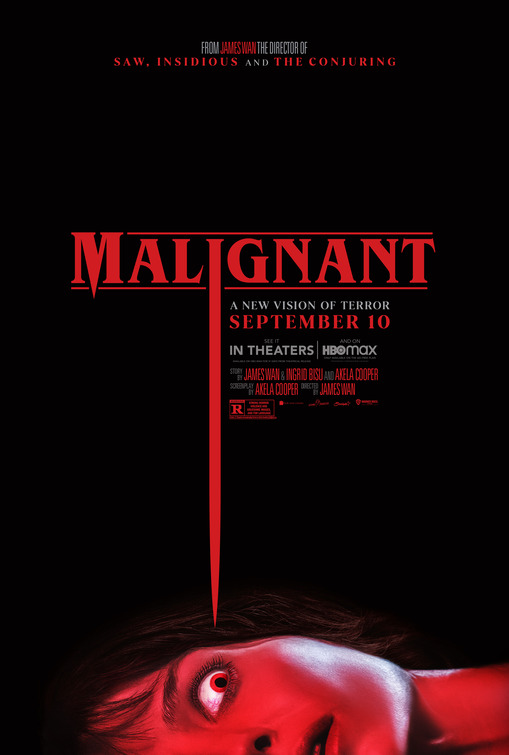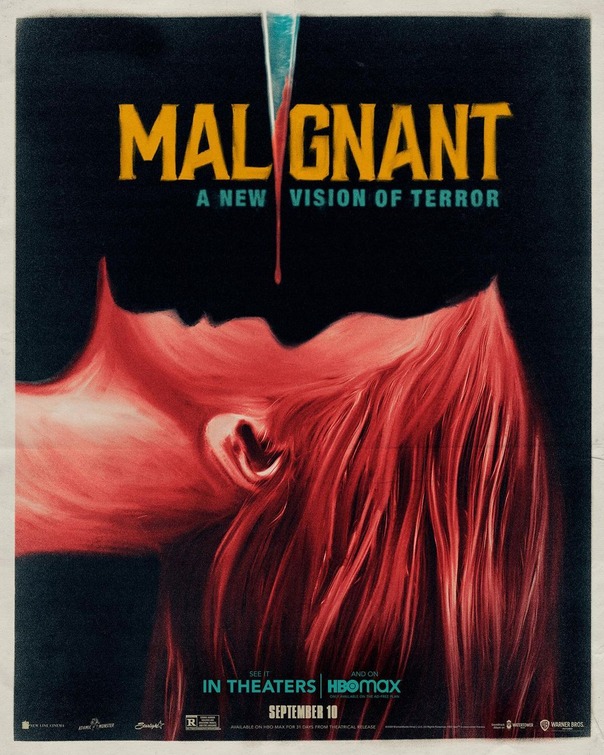James Wan has arguably been the most influential force in American horror during the 21st century. Not only has he shaped three popular franchises, but he’s also inspired Hollywood to pivot its genre fare alongside his success, whether it was SAW ushering in a wave of ultraviolence or the one-two punch of INSIDIOUS and THE CONJURING shifting the genre back to haunted house spook-a-blasts. Even more impressive, however, is how daring and weird his work remains, which is no small feat when you consider his success in a studio arena that asks filmmakers to serve many masters at once. While SAW was an independent effort, it’s still worth noting that nobody was exactly making puzzle box giallo homages in 2003, and he parlayed its success into DEAD SILENCE, a major studio candy-colored funhouse ride that refused to coast on its predecessor’s coattails. INSIDIOUS sprawled into a multi-generational epic with a sequel that once again saw Wan refusing to simply fulfill expectations. Likewise, his two CONJURING films thrive on sentimentality as much as scares — I mean, who else is letting Patrick Wilson sing Elvis right in the middle of a sequel to one of the most gripping haunted house movies in recent memory? Considering that Wan has flourished in a Hollywood landscape where executives often prize risk-aversion above all else, it’s easy to take his success — and his eclectic, eccentric work — for granted.

We shouldn’t have this problem with MALIGNANT, though. Following immense success in the blockbuster arena, where FURIOUS 7 and AQUAMAN earned a combined $2.6 billion, Wan has taken all of the chips that kind of goodwill earns you and bet big on himself. Once again defying expectations, he handed off the third CONJURING off to frequent collaborator Michael Chaves and went off and made MALIGNANT, a delirious genre cocktail that evokes both the heights of vintage Eurohorror and its even more unhinged death rattle. This is to say it’s Wan’s PHENOMENA and TRAUMA all at once, a movie that operates on its own logic and drags its audience along for the wild ride. Bumps and bruises ensue as its twists and turns thump your skull into submission, to the point where you can only submit to its singular madness. Two decades into a career full of big swings, Wan has conspired with co-writers Akela Cooper and Ingrid Bisu to flail away like a madman with an ax, and the only thing more galling than these wild hacks is the fact that they connect. MALIGNANT doesn’t just land glancing blows, either: this is a full-on face splitter that will be a midnight movie staple within a decade.

A prologue whisks us away to a psychiatric research hospital in 1993, where a mysterious child patient named Gabriel raises hell: in addition to killing some of the staff, he’s also apparently capable of making the electricity go haywire. We never see his face, but it’s obvious he’s a force to be reckoned with, and it’s equally obvious that Wan and company won’t be modest: there’s something wild and untamed about a movie that roars out of the gate like this, and MALIGNANT keeps that energy throughout. When it flashes ahead to the present day, it treats us to a few minutes of relative calm in introducing Madison Lake (Annabelle Wallis), a pregnant woman with a troubled domestic life. Her previous two miscarriages have only exacerbated the contentious relationship with her abusive husband Derek (Jake Abel), who pummels her against a wall during the couple’s latest argument. Later that night, Madison dreams of a mysterious intruder breaking into their home to murder Derek, only to discover that the horrific deed has actually occurred when she finds her husband splattered across the living room. The ordeal triggers another miscarriage and unlocks a strange phenomenon within Madison’s mind when she supernaturally witnesses more slayings by the same mysterious madman.
MALIGNANT is one of those movies that leaves me fumbling for the right words to describe it. The usual suspects — ”weird,” “bonkers,” “gonzo” — are either cliché or inadequate because they don’t capture the entire breadth of the idiosyncratic lunacy on display here. I keep coming back to the word “askew,” though, so let’s settle on that: there is just something off about MALIGNANT in the best way possible. It knocks you from your axis immediately and never wants you to recover. Between the breakneck pacing, Wan’s whirling dervish camerawork, and its cocktail of influences, it’s a disorienting spiral that never quite feels it should be of this earth. In this respect, it conjures up the sensation of those off-kilter Eurohorror dispatches that just don’t feel right. There’s more to this particular homage than Goblin-esque synthesizer noodling and fluorescent lighting (though there’s plenty of that to spare here); Wan recognizes that it’s more about capturing a particular, alienating energy, and he seizes upon that. MALIGNANT often seems driven by pure, spiteful defiance to play by any expected rules, choosing instead to forge its own twisted logic.
That’s a hallmark of the Eurohorror Wan channels, but it must be noted that Eurohorror is like snowflakes: none of it is exactly alike, especially films hailing from different eras. MALIGNANT initially feels like a scrambled, vintage ’70s giallo, from the obvious aesthetic choices (black gloves and ornate murders) to an increasingly labyrinthine plot that finds Madison and her sister (Maddie Hasson) digging into a twisted family history to uncover repressed trauma. However, it ultimately lands in the realm of the later Italian period, when the gloves came off and filmmakers thoroughly dispensed with notions of tact and taste. While this era was much less refined than the glory days, there’s something to be said for its unhinged mania: truly, these were some of the wildest films produced by these notorious schlock masters, and Wan also harnesses that untamed energy down the stretch here with a third-act reveal that plunges headlong into nonsense. Yes, dedicating even a cursory second thought to the logic here collapses MALIGNANT like a house of cards; no, that is not necessarily a bad thing because you love to see someone with such immense talents unloading the clip and going for broke. If you can accept the nonsense that underpins so many horror movies (some of them immortal classics), then MALIGNANT isn’t exactly asking you to make a huge leap. It just needs you to go with it. Don’t worry about the bumps and bruises along the way; after all, horror is sometimes at its best when you’re not sure if it’s just fucking with you and you have to trust where it’s going.
Doing so in this case is immensely rewarding. Eventually, it becomes clear that MALIGNANT is just fucking around, and it’s delightful. Even at its most grim, Wan’s work is always playful — I don’t know that there’s been a filmmaker that’s loved playing an audience like a fiddle this much since Sam Raimi. MALIGNANT continues this in a big way, blending those Eurohorror influences with other genre scraps: a little Frank Henenlotter here, some Dark Castle there, not to mention a few others I won’t name so I don’t give up the ghost. Wan especially leans into the psychological thrillers of the early aughts, which often culminate in a familiar twist that MALIGNANT edges up to before darting off in a different direction with a reveal that cements its place as a singular fit of madness. Genre homages — especially those blending wild cocktails like this — have to navigate the pitfalls of reverence, and stumbling in either direction yields derivative junk or some kind of blank parody that can’t stand on its own. What’s most impressive about MALIGNANT is how it bounds right over these concerns: despite taking inspiration from multiple sources, Wan has forged an idiosyncratic gem, a big gothic-drenched melodrama that’s arch but not ironic and matches its audacity with sharp craftsmanship.
That’s the big difference between MALIGNANT and other nonsense of this sort: it’s not just that Wan and company dare to dream big, it’s that they also have genuine chops to back it up. There are big, obvious highlights, like a climactic set piece that blends gore and blockbuster theatricality in a way we haven’t seen since BLADE, or Joseph Bishara’s evocative, blaring score that samples The Pixies. But there’s smaller, more subtle choices littered throughout, from odd costuming (Zoe Bell appearing in a women’s prison, exclaiming “What the fuck?!” speaks for all of us) to incredible set design (a breathtaking shot of the dilapidated hospital overlooking a cliff feels like it’s been ripped right out of a gothic novel). Gabriel’s monstrous design is a masterclass of digital and practical effects work, especially when Wan indulges two dramatic reveals that inspire gasps of awe and uncomfortable squirming in equal measure.
Wan carefully anchors these big swings with sturdy, more conventional choices, particularly his treatment of the characters. Bolstered by a game cast that’s dialed into the right wavelength, the characters are compelling enough to keep the proceedings from spiraling out of hand. Where so much outlandish genre fare winks and nudges its audience into submission with broad performances, effectively killing the gag, MALIGNANT doesn’t allow its cast of characters to lapse into detached irony. Wallis and Hasson keep everything grounded just enough with a nice, uncomplicated depiction of sisterhood, while George Young and Michole Briana White offer comic relief as a bemused pair of detectives who feel like they could headline their own X-FILES knock-off. One of the reasons Wan’s horror resonates so well is his investment in characters, and MALIGNANT is no different: it might go wild with its choices, but it never does so at the expense of telling a genuine, sincere story about a woman processing and living with repressed trauma. It just also happens to be one where she spider-walks through the third act.
Of course, it’s fair to say that it’s those other, more outlandish choices that really define MALIGNANT, and that’s absolutely fine. In fact, that’s ultimately what’s so striking here: this is a collection of deliberate choices, not some bland “content” that’s been test screened within an inch of its life to increase its odds of attracting eyeballs in the age of the almighty algorithm. It’s not the product of some board room full of execs whose script notes stripped it of all its personality. Instead, they’ve graciously allowed Wan to slip one past the goalie, and it’s probably not going to inspire the next big thing or WB’s next horror franchise. Something tells me it’ll be cited as an influence for young and emerging filmmakers, though. I don’t think there’s such a thing as an instant classic, much less an instant cult classic — only time can tell such a tale. I do, however, think MALIGNANT is well on its way, and it’s most certainly a reminder to underestimate James Wan at your own peril.
Tags: Akela Cooper, Andy Bean, Annabelle Wallis, Christian Clemenson, George Young, Ingrid Bisu, Jacqueline McKenzie, Jake Abel, Jean Louisa Kelly, Joseph Bishara, Kirk Morri, Maddie Hasson, Madison Wolfe, Marina Mazepa, Mckenna Grace, Michael Burgess, Michole Briana White, Patricia Velasquez, Ray Chase, Susanna Thompson, zoe bell



No Comments